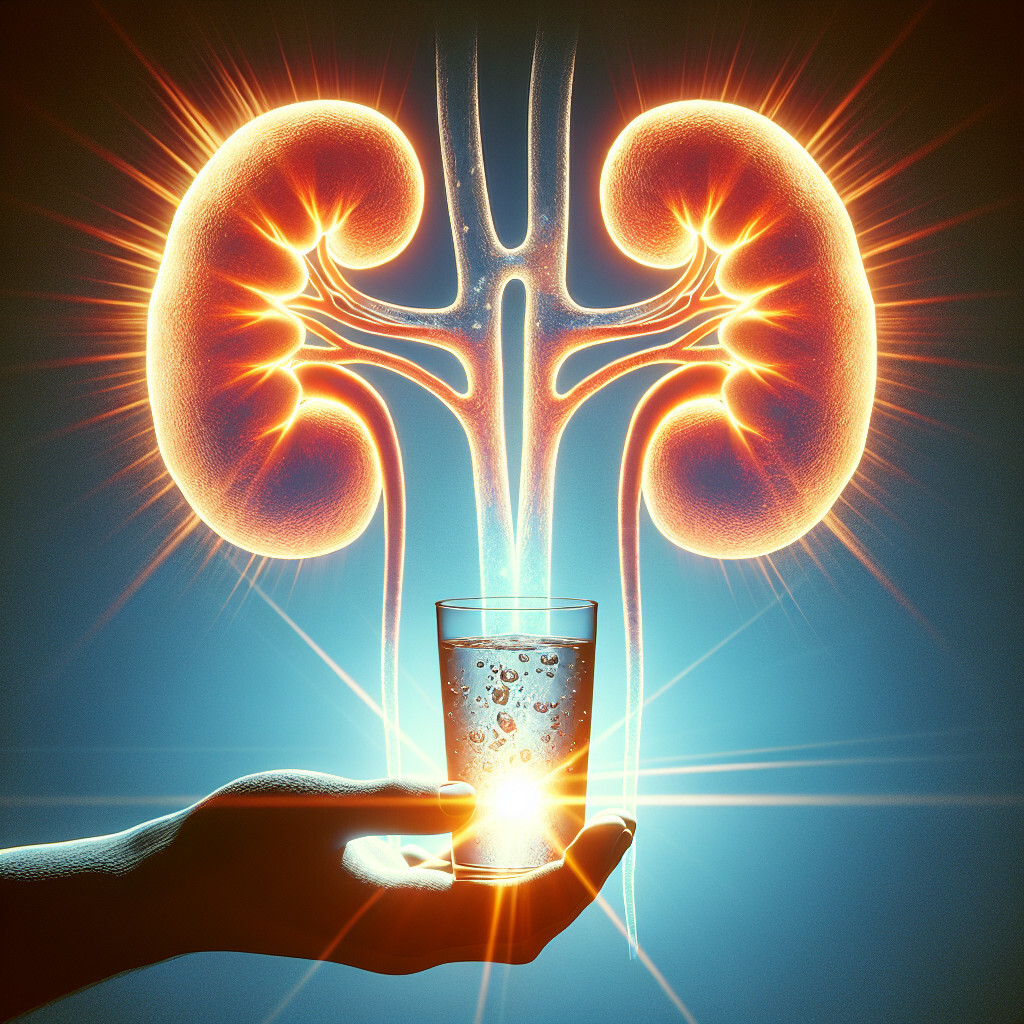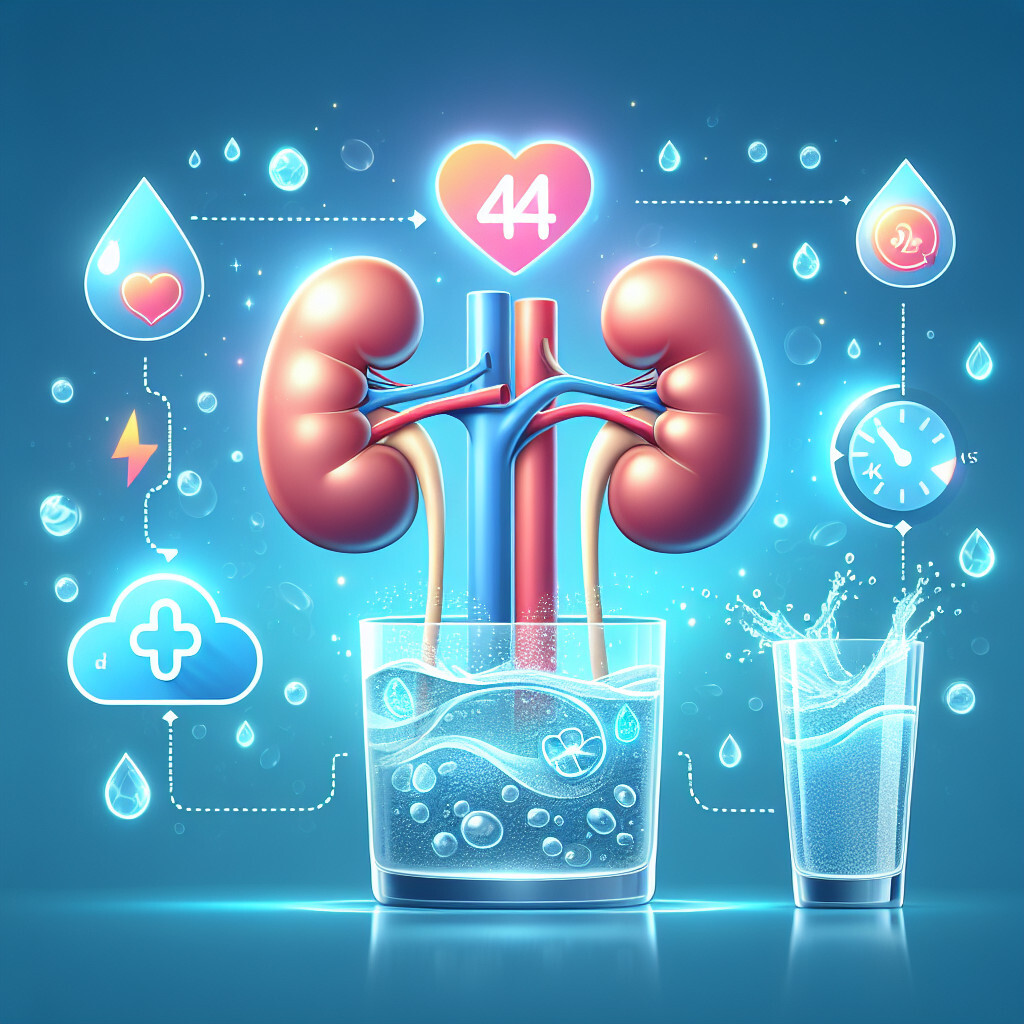-
Table of Contents
“Water: Your Kidneys’ Best Ally for Optimal Health and Function!”
Introduction

Drinking water provides numerous benefits to the kidneys, a vital organ responsible for filtering waste from the body. Adequate water intake helps the kidneys to clear sodium, urea, and toxins from the body, preventing them from causing harm. It also reduces the risk of chronic kidney disease by preventing the formation of kidney stones and urinary tract infections. Furthermore, staying well-hydrated helps the kidneys to distribute essential nutrients and minerals throughout the body effectively. Therefore, drinking water plays a crucial role in maintaining kidney health and overall well-being.
Understanding the Role of Water in Promoting Kidney Health
Water, the elixir of life, plays a pivotal role in maintaining the overall health of the human body. Among its numerous benefits, one of the most significant is its contribution to kidney health. The kidneys, two bean-shaped organs located at the lower back, are responsible for filtering waste products, excess nutrients, and electrolytes from the bloodstream, which are then excreted in the urine. This process is crucial for maintaining the body’s chemical balance and blood pressure. However, the kidneys’ ability to perform these functions efficiently largely depends on adequate water intake.
Water is the primary medium through which the kidneys filter waste from the blood. It aids in the dissolution of waste substances, making it easier for the kidneys to eliminate them. When the body is well-hydrated, the kidneys can efficiently remove toxins and waste materials, reducing the risk of kidney stones and urinary tract infections. Conversely, inadequate water intake can lead to dehydration, causing the urine to become concentrated. This concentration can result in the formation of kidney stones, a painful condition that occurs when waste products crystallize and form hard deposits in the kidneys.
Moreover, water plays a crucial role in regulating blood volume and pressure, both of which are vital for kidney health. The kidneys help control blood pressure by adjusting the volume of blood that is filtered and returned to the bloodstream. When the body is dehydrated, the blood volume decreases, causing the blood pressure to drop. To compensate for this, the kidneys retain more water, leading to a higher concentration of waste products in the blood and urine. Over time, this can cause damage to the kidneys and lead to chronic kidney disease.
In addition to preventing kidney stones and maintaining blood pressure, adequate water intake can also help prevent other kidney-related diseases. For instance, chronic kidney disease, a condition characterized by the gradual loss of kidney function over time, is often caused by high blood pressure and diabetes. Drinking enough water can help control blood sugar levels and blood pressure, thereby reducing the risk of chronic kidney disease.
Furthermore, water can help dilute the substances in urine that can cause kidney infections and cysts. Kidney infections are typically caused by bacteria that enter through the urinary tract and multiply in the kidneys. Drinking plenty of water can help flush these bacteria out of the body, reducing the risk of infection. Similarly, kidney cysts, which are fluid-filled sacs that form on the kidneys, can be prevented by maintaining proper hydration.
In conclusion, water plays an indispensable role in promoting kidney health. It aids in waste elimination, prevents the formation of kidney stones, regulates blood volume and pressure, and reduces the risk of kidney-related diseases. Therefore, it is essential to ensure adequate water intake daily. While the amount of water required can vary depending on factors such as age, sex, weight, and physical activity level, a general guideline is to drink at least eight 8-ounce glasses of water per day. However, individuals with kidney disease or other health conditions may need to modify their water intake and should consult with a healthcare provider for personalized advice.
The Impact of Hydration on Kidney Function
Water, the elixir of life, plays a pivotal role in maintaining the overall health of the human body. Among its numerous benefits, one of the most significant is its impact on kidney function. The kidneys, two bean-shaped organs located at the lower back, are responsible for filtering waste products, excess nutrients, and electrolytes from the bloodstream. They also regulate blood pressure, red blood cell production, and the balance of acids and bases in the body. Adequate hydration is crucial for these functions to occur efficiently, underscoring the importance of drinking water for kidney health.
The primary role of the kidneys is to filter the blood, removing waste products and converting them into urine. This process requires a sufficient amount of water to facilitate the movement of these substances through the kidneys. When the body is adequately hydrated, the kidneys can efficiently filter the blood, leading to the elimination of waste products through urine. Conversely, when the body is dehydrated, the kidneys must work harder to filter the same amount of blood, which can lead to kidney damage over time.
Moreover, staying well-hydrated helps prevent the formation of kidney stones, a painful condition that occurs when waste products crystallize in the kidneys. Drinking plenty of water dilutes these substances, making it less likely for them to form stones. Studies have shown that individuals who consume more water have a lower risk of developing kidney stones.
In addition to preventing kidney stones, adequate hydration can also help prevent urinary tract infections (UTIs). UTIs occur when bacteria enter the urinary tract, often leading to painful symptoms and potentially serious complications if left untreated. Drinking plenty of water helps flush bacteria out of the urinary tract, reducing the risk of infection.
Furthermore, water plays a crucial role in regulating blood pressure, a function that is partly controlled by the kidneys. When the body is dehydrated, the volume of blood decreases, causing the blood vessels to constrict and leading to an increase in blood pressure. By maintaining proper hydration, the kidneys can effectively regulate blood pressure, reducing the risk of hypertension and associated health problems.
While the benefits of drinking water for kidney health are clear, it’s important to note that the amount of water needed can vary from person to person. Factors such as age, sex, weight, physical activity level, and overall health can influence individual hydration needs. As a general guideline, health experts often recommend drinking at least eight 8-ounce glasses of water per day, although some individuals may require more.
In conclusion, drinking water plays a vital role in maintaining kidney health. It aids in the filtration of waste products, prevents the formation of kidney stones, reduces the risk of urinary tract infections, and helps regulate blood pressure. While the amount of water needed can vary, ensuring adequate hydration is a simple and effective way to support kidney function and overall health. Therefore, it is essential to make drinking water a regular part of your daily routine.
Preventing Kidney Stones: The Importance of Drinking Water
The human body is a complex system that relies on a balance of nutrients and hydration to function optimally. One of the most critical components of this balance is water, which plays a vital role in maintaining the health of our kidneys. The kidneys, two bean-shaped organs located at the back of the abdomen, are responsible for filtering waste products, excess nutrients, and electrolytes from the bloodstream. They also regulate blood pressure, maintain the body’s water balance, and produce hormones that influence the function of other organs. Therefore, maintaining kidney health is crucial for overall well-being, and one of the most effective ways to do this is by drinking an adequate amount of water.
Drinking water is essential for kidney health because it helps the kidneys filter blood more efficiently and produce urine, which carries waste products out of the body. When the body is adequately hydrated, the kidneys can easily remove toxins and waste materials, reducing the risk of kidney disease and other health problems. Moreover, water helps dilute the substances in urine that can form kidney stones, thus preventing their formation.
Kidney stones are hard deposits made of minerals and salts that form inside your kidneys. They can cause severe pain and are often the result of concentrated urine, which allows minerals to crystallize and stick together. Drinking enough water can prevent kidney stones by diluting the substances in urine that cause stones to form. If you’ve had kidney stones in the past, or if they run in your family, your chances of developing them are quite high. However, increasing your water intake can significantly reduce this risk.
The amount of water needed can vary depending on factors such as age, sex, weight, and overall health. However, a general guideline is to aim for at least eight 8-ounce glasses of water a day, which equals about 2 liters, or half a gallon. This is known as the “8×8 rule” and is easy to remember. However, it’s important to note that individual hydration needs can vary, and some people may need more or less water depending on their health status, physical activity level, and climate.
In addition to preventing kidney stones, drinking water has numerous other health benefits. It aids in digestion, helps maintain healthy skin, regulates body temperature, and even boosts mood. Furthermore, staying hydrated can improve physical performance, making it easier to engage in regular exercise, which is also beneficial for kidney health.
While water is the best choice for hydration, other fluids and foods can also contribute to your daily water intake. Fruits and vegetables, for instance, can be a good source of hydration due to their high water content. However, it’s essential to be mindful of the intake of beverages like coffee, tea, and soft drinks, which can lead to dehydration due to their caffeine content.
In conclusion, drinking an adequate amount of water is a simple yet effective way to maintain kidney health and prevent kidney stones. It’s a small lifestyle change that can have a significant impact on your overall health. So, make a habit of carrying a water bottle with you and sipping on it throughout the day. Your kidneys, and indeed your entire body, will thank you.
How Adequate Water Intake Can Reduce the Risk of Chronic Kidney Disease
The human body is a complex system that relies on a delicate balance of nutrients and fluids to function optimally. One of the most critical components of this balance is water, which plays a vital role in maintaining the health of our kidneys. The kidneys, two bean-shaped organs located at the back of the abdomen, are responsible for filtering waste products from the blood and regulating the body’s fluid balance. Chronic Kidney Disease (CKD), a condition characterized by the gradual loss of kidney function over time, can be significantly influenced by our water intake. This article will explore how adequate water consumption can reduce the risk of CKD and promote overall kidney health.
Water is essential for the kidneys to perform their primary function: filtering blood. Every day, our kidneys process about 200 quarts of blood to sift out about 2 quarts of waste products and extra water. The waste and water become urine, which flows to the bladder through tubes called ureters. Without sufficient water intake, the kidneys must work harder to perform this function, potentially leading to dehydration and, over time, kidney damage.
Dehydration, even mild, can cause a strain on the kidneys and lead to kidney stones, a hard mass formed from crystals that separate from the urine and build upon the inner surfaces of the kidney. Kidney stones are often incredibly painful and can be a precursor to CKD. By drinking an adequate amount of water, the risk of kidney stones can be significantly reduced as water helps dilute the substances in urine that lead to stones.
Moreover, water plays a crucial role in preventing urinary tract infections (UTIs), which can cause kidney infections if left untreated. UTIs occur when bacteria enter the urinary tract and multiply in the bladder. Adequate water intake can help prevent UTIs by diluting the urine and ensuring that you urinate more frequently, flushing bacteria out of your system.
In addition to preventing kidney stones and UTIs, adequate water intake can also help manage blood pressure, a critical factor in kidney health. High blood pressure can damage blood vessels in the kidneys, reducing their ability to work properly. When the body is well-hydrated, the heart can pump blood more easily, allowing blood vessels to relax and consequently lowering blood pressure.
While the benefits of drinking water for kidney health are clear, it’s important to note that the amount of water needed can vary depending on factors such as age, sex, weight, and overall health. The commonly recommended eight 8-ounce glasses of water a day may not be suitable for everyone. It’s always best to consult with a healthcare provider to determine the right amount of water for you.
In conclusion, maintaining adequate water intake is a simple yet effective way to promote kidney health and reduce the risk of CKD. By helping the kidneys filter blood, preventing kidney stones and UTIs, and managing blood pressure, water plays a crucial role in our overall kidney health. As we strive to make healthier choices in our lives, let’s not forget the importance of this vital, life-sustaining liquid. After all, water is not just a thirst quencher; it’s a kidney protector.
Q&A
1. Question: How does drinking water benefit the kidneys?
Answer: Drinking water helps the kidneys remove waste from the blood in the form of urine, regulate body temperature, and maintain a healthy balance of electrolytes.
2. Question: Can drinking water prevent kidney stones?
Answer: Yes, staying well-hydrated can help prevent the formation of kidney stones. Water dilutes the substances in urine that lead to stones.
3. Question: How does water intake affect kidney function?
Answer: Adequate water intake helps the kidneys clear sodium, urea, and toxins from the body, which in turn reduces the risk of chronic kidney disease.
4. Question: Can drinking water improve kidney health in people with kidney disease?
Answer: Yes, drinking enough water can help slow the progression of kidney disease by supporting the kidneys in their function of filtering waste and toxins from the blood.
Conclusion
In conclusion, drinking water benefits the kidneys by aiding in the removal of waste products from the body, preventing kidney stones and urinary tract infections, maintaining proper kidney function, and potentially reducing the risk of chronic kidney disease. Adequate hydration is essential for maintaining overall kidney health.






